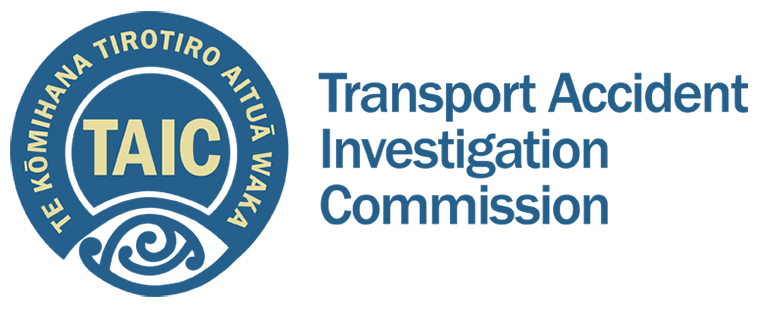The Commission opens an inquiry when it believes the circumstances of an accident or incident have - or are likely to have - significant implications for transport safety, or when the inquiry may allow the Commission to make findings or recommendations to improve transport safety. We consider a range of factors when deciding whether to investigate.
How we hear about accidents and incidents
Separate laws establishing the regulatory environment for each transport mode require specified individuals (such as drivers or operating organisations), to notify the modal regulator (Civil Aviation Authority, Maritime New Zealand, or NZ Transport Agency) of the occurrence, and for the regulator to then inform us. We then decide whether to open an inquiry, and let the regulator know. Often we will seek further information before deciding whether to open.
Sometimes we learn of an occurrence through the media, direct contact from someone involved, or from an overseas agency like us. Equivalent overseas organisations sometimes ask the Commission to participate in their investigation if the event involves a New Zealand operated or manufactured vehicle, or a significant number of New Zealanders. The Minister of Transport may direct us to hold an inquiry but the Minister plays no role in the inquiry.
Each year we receive about 1000 notifications and open about 10-15 inquiries.
Military and road accidents are not the Commission’s responsibility unless they involve civilian, maritime, rail or air transport.
Deciding to investigate
There is a duty investigator available 24/7 to receive urgent notifications, while the Chief Investigator of Accidents is delegated the authority to open inquiries on behalf of the Commission. The Commissioners review all notifications received monthly. When the decision is made to open an inquiry, an investigator-in-charge is appointed, along with other key team members. The Commissioners and a number of individuals and organisations are notified. These can include emergency services, organisations connected with the accident vehicle or site, Coroner, WorkSafe, modal regulator, Ministers and Ministry of Transport, as well as any overseas peer agency who may have a right or interest in the case. Foreign states have rights of participation when the aircraft or ship is registered there, or when an airframe or aircraft engine was manufactured there, or a significant number of their citizens died or were seriously injured. The new inquiry is added to our website database as soon as possible during working hours, unless it is a higher profile event in which case we may post news items on the TAIC website and/or issue media statements.
Opening criteria considered
Circumstances influencing a decision to open an inquiry
There is no strict formula which we apply to deciding whether the circumstances involve significant implications for transport safety or that findings or recommendations to improve transport safety could result. We take into account factors such as:
- Number of people (actual or potential) killed or seriously injured
- Vehicle capacity for passengers, freight, or pollutants
- Whether dangerous goods are involved
- Extent of vehicle damage
- Interfaces, such as traffic control, regulatory action, policy, or shared service provision
- Environmental, economic or social impact beyond those immediately involved
- Safety issues raised before
- Whether regulatory, health & safety, or coronial investigation would satisfy safety interests
- Anything else that may be relevant to the particular occurrence
International considerations
The Commission’s legal framework and working practices are consistent with international obligations and standards for air and maritime transport, and they influence the Commission’s decision regarding the opening of inquiries. We may support an international peer organisation's inquiry into an aviation or maritime occurrence in their jurisdiction if they ask for help, or because the NZ connection gives us a right or obligation to participate.
Aviation: Annex 13 to the International Convention on Civil Aviation says:
- a member state ‘shall’ investigate an accident when: a person is fatally or seriously injured as a result of being in an aircraft or comes into contact with any part of the aircraft (including parts which have become detached from the aircraft), or as a direct exposure to jet blast; and/or when the aircraft sustains damage or structural failure which adversely affects the structural strength, performance or flight characteristics of the aircraft and would normally require major repair or replacement of the affected components.
- The member state ‘should’ investigate a serious incident involving: near collisions; take-offs, aborted take-offs or attempted landings on closed or engaged runways; fires; smoke; use of emergency oxygen by flight crew; structural failures; engine disintegration; crew incapacitation in flight; fuel emergency; runway undershoots and overshoots; system failures; weather; operations outside approved envelopes; or failure of more than one system in a redundancy system mandatory for flight guidance and navigation.
Maritime: under the International Maritime Organisation (IMO) casualty code , a member state:
- ‘shall’ investigate every ‘very serious marine casualty’ (total loss of a ship, or a death, or severe environmental damage).
- ‘should’ investigate if it would likely help prevent future marine casualties and incidents.
Other factors
Finally, we take into account whether the circumstances relate to an item on our own Watchlist as well as any current notification trends. Often we seek further information before confirming a decision, and sometimes we ask a regulator to keep us in touch with their investigation into an event in case new information comes up that would cause us to open an investigation of our own.
